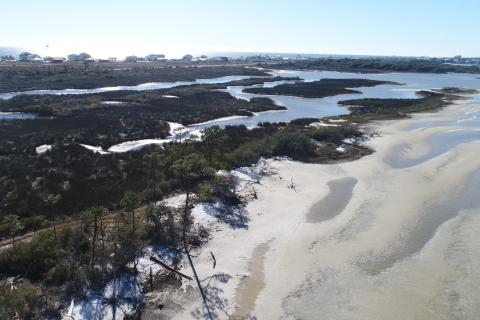Approximately 99 acres of property on Fort Morgan Peninsula in Alabama was preserved for conservation on December 28, 2021, thanks to a joint effort with the Regionwide Trustee Implementation Group—including trustees from the Alabama Department of Conservation and Natural Resources and the Department of the Interior—and The Nature Conservancy. The area is known as Pilot Town for its historical significance as the former location of a community of bar pilots that helped ships navigate sandbars in Mobile Bay. The settlement was destroyed in a 1906 hurricane.
Nestled amongst surrounding homes, resorts, and local businesses exists a diverse ecosystem that provides a haven for many coastal species. The Pilot Town property includes sandy shrub scrub, coastal marsh, and several brackish inland lagoons, which provide important habitat for a host of species.
As part of the Trustee Implementation Group’s September 2021 Restoration Plan 1, the property was acquired for incorporation into the Bon Secour National Wildlife Refuge. The $6.5 million land acquisition project provides conservation and enhancement of nesting and foraging habitats for birds, habitats that were injured by the Deepwater Horizon oil spill. The Refuge is one of the most important stop-over sites for migratory birds. It also plays a critical role for endangered species such as the Alabama beach mouse, nesting sea turtles, and wintering piping plovers.
The group’s first Restoration Plan addresses restoration of other natural resources injured by the oil spill. It includes a portfolio of projects intended to restore sea turtles, marine mammals, oysters, and birds. The Plan provides nearly $100 million for 11 restoration projects across the Gulf region.


